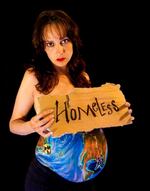
In addition to voicing most of the female characters on "South Park," Eliza Jane Schneider has created characters for everything from the animated film “Finding Nemo” to the TV series “King of the Hill” to video games like “Assassin’s Creed.”
Courtesy of Eliza Jane Schneider
To have a conversation with actor Eliza Jane Schneider is to feel like you're talking with half of the English-speaking world. She slides so easily between Southern Pentecostal, Nigerian street slang, Liverpudlian, and Keira Knightley–British (OK, just Keira Knightley).
In a way you are: Schneider has traveled the globe in her quest to record English in all of its myriad forms. And chances are, you've heard her voice. For five years, she played most of the female characters on "South Park": Wendy, Shelly, Mrs. Cartman, the Mayor, the Principal. She’s created characters for everything from the animated film “Finding Nemo” to the TV series “King of the Hill” to video game franchises like “Assassin’s Creed” and "Pirates of the Caribbean" (thus, the Keira Knightley).
She teaches dialects worldwide, and performs award-winning plays and one-woman shows, the newest of which, "Displaced," premieres Jan. 20–28 in Portland.
Schneider traces her knack for dialects to her early years, growing up on a Chippewa reservation with a German theater teacher for a father, a Jewish lawyer for a mother, and an adopted Vietnamese brother.
"I am a Suzuki-trained violinist since age 7," she said, "and that is an ear training method, so my brain started applying that to languages — everything sound — so that anything I hear I like to mimic."
Aspiring to be an actor, she got a full-time role in the children's show "Beakman's World" in the early 1990s. But like many of her Generation X peers, she found herself wanting more direct and authentic connections to people. So she had an idea.
"There was no existing dialect material for actors other than a guy David Alan Stern imitating people," she said. "The idea is, I would go and collect all of the dialects of spoken English of the entire world, starting with America. I figured it would take me about a month — and I've been doing it for 25 years."
Schneider bought an ambulance from the Los Angeles classified section, since it had AC plugs for her recorder, and set off across America. That first trip she logged 17,000 miles before having to return to L.A. for a gig in a three-day haul. Over the years she added more dialects — Navajo, New Orleans, the Pacific Northwest — and eventually turned them into the award-winning show "Freedom of Speech," where she channeled 34 of the most memorable individuals she met in her travels.

"The moment you look somebody in the eye who normally gets ignored, you’ve made a friend," says actor Eliza Jane Schneider of her reason for focusing on the stories of people living on the streets in her show "Displaced." "Because there’re so many people who just walk right by. They’ve trained themselves and their kids not to see the people living on the streets. And that is so dehumanizing."
Michael Spezialy
Schneider has since relocated to Portland and is premiering her newest one-woman show as part of the Fertile Ground Festival of New Works. Where "Freedom of Speech" focused on the U.S., "Displaced" casts a global net, collaging houseless and displaced people internationally.
"As I cruised around the world collecting dialects, my welcome committee was the people living on the streets — they're the people who you meet when you first get there," she said. "It just became so painfully evident, especially in the Western world: the moment you look somebody in the eye who normally gets ignored, you’ve made a friend. Because there are so many people who just walk right by. They’ve trained themselves and their kids not to see the people living on the streets. And that is so dehumanizing."
Directed by Bruce Hostetler and produced by CompassWorks, "Displaced" takes the shape of conversations between Schneider, as the traveling busker, and the individuals she’s singing to. She takes on their dialects and answers word for word, accent for accent, to try to reflect their voices into the theater, alongside her own music. Given it is a staged reading and not a full production, the cast of characters may change night to night and include stories from Portlanders.
"Portland is having a big crisis with our homeless community right now: four people died from exposure," she says. "The question is, What can we do? How do we fix a problem that seems unfixable? And at the end of the play we come to a lot of conclusions about that and the power of seeing and hearing and listening, and the power that has to heal."
Audiences members are invited to bring clothes, blankets, cold medicine, and gift certificates to grocery and hardware stores to donate to one of the show's partner nonprofits, Portland Homeless Family Solutions, Hereford House and p:ear - Creatively Mentoring Homeless Youth.

